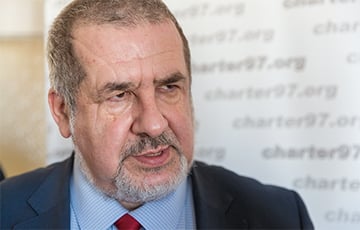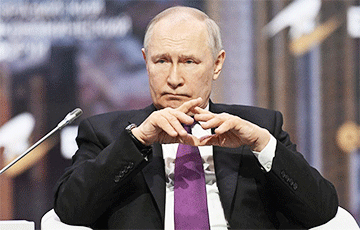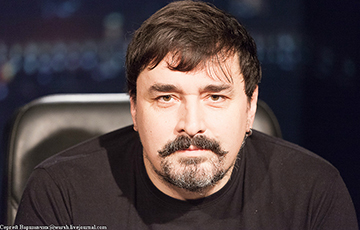Refat Chubarov: We Must End The War With The Return Of Crimea
7- 16.05.2022, 11:45
- 11,042

PHOTO: CHARTER97.ORG
Ukraine will restore its territorial integrity.
People's attention is distracted from what is happening now in occupied Crimea due to the start of Russia's massive offensive against Ukraine. The head of the Mejlis of the Crimean Tatar People, Refat Chubarov, told the Charter97.org website about the situation on the peninsula, the struggle of the Crimean Tatars against the aggressor, and also shared his vision of the liberation of the occupied territories:
— On February 24, Russia launched a full-scale invasion of the Ukrainian mainland. Crimea played a special role in the invasion, occupied eight years ago, it was one of those territories where Russian military equipment and Russian military personnel were accumulated for months for the planned invasion. And one of the main attacks on mainland Ukraine in the early morning of February 24 was carried out directly from the Ukrainian but occupied Crimea.
Therefore, Crimea now borders the recently occupied territories. This is the Kherson region and Zaporizhzhia region through the Kherson region, relatively. A significant part of the Zaporizhzhia region is also occupied, there were battles. Then the Russian troops went to Berdiansk and Mariupol.
And now the Crimea is territory for the killed Russian soldiers and the wounded and returned from the battlefields and fierce fights. In the first weeks on the territory of the Crimea, in the city of Dzhankoi, one of the schools was adopted to be a military hospital, and the wounded were taken there. Killed Russian soldiers were in the Crimean morgues. It was very important for the Russian military not to return all the dead Russian soldiers to their relatives so that they would not have an idea of how big the losses were. Now, through Crimea, the forged Russian vehicles are sent to factories in Kerch and to the territory of Russia.
Everything that is connected side by side with military operations takes place before the eyes of the Crimean society. That is why it is very important for the Russian occupiers to strengthen control over the Crimean society. They use two methods for this. The first is immense propaganda day and night, 24 hours a day, seven days a week. It's an attempt to zombie people with stories about the Nazis and stuff. And the second method is intimidation, further toughening of repressions and persecutions.
It is not just like it was before. The persecution has intensified, since several more norms have been introduced into the administrative codes of the Russian Federation, such as “compromising the Russian armed forces”. So far, this is still an administrative offence, but in Crimea, at least a week ago, when we were monitoring, 36 people were brought under this article for statements that, from the point of view of the Russian state, belittle and compromise the Russian army. Zair Smedlyaev, the chairman of the Central Election Commission of the Kurultai of the Crimean Tatar People, was one of the first to be brought under this article. He served two days and received a fine.
Trials of previously illegally arrested Crimean Tatars continue in Crimea. One of these courts is the court hearing against the first deputy chairman of the Mejlis, Nariman Dzhelyalov, and two young activists of the Crimean Tatar National Movement, Aziz and Asan Akhtemovs. They are accused of allegedly "preparing and committing acts of sabotage against a Russian military unit on the territory of Russia as part of an organized group". They face up to 20 years in prison.
The vast majority of Crimean Tatars are tried under articles for terrorism and, in accordance with Russian legislation, these articles are tried by military courts. The military court closest to the territory of the occupied Crimea is located in Rostov-on-Don. There, they hold the hearings there. People get 13, 17, and 19 years in prison.
The trial [in absentia] in relation to the leader of the Crimean Tatar People, Mustafa Dzhemilev, has ended (the dream the whole thing up), allegedly for illegal possession of weapons during the years of Ukrainian sovereignty, as well as an accident allegedly related to these weapons. Everyone understood that even under the conditions of Russian justice, such an attempt would not be able to give anything serious, but for the Russian occupiers, the constant decrepitation of the leaders of the Crimean Tatars is very important. And this trial ended with a suspended sentence, but the occupational prosecutor did not agree, demanded four years, and now everything will start again. They need it so much for their propaganda.
— Do you think that after the outbreak of hostilities, the tense situation with human rights became even worse?
— Yes, there is very strong information and psychological pressure, denunciation and provocation of people who do not want to publicly speak out in support of Putin and the so-called special military operation. They come to the leaders, film it all and ask: “How do you feel about Putin? How do you estimate this operation?" And, of course, some unstable people are afraid and say what is expected of them on camera.
— There are a disproportionate number of Crimean Tatars among Ukrainian political prisoners in Russia. Is there any possibility for their exchange?
— The Russian special services, preparing for the Russian occupation of Crimea, were aware that the Crimean Tatars were the most organized force in Crimea. Accordingly, they tried to apply in relation to the Mejlis, the representative body of the Crimean Tatar people, the entire arsenal of tools familiar to the Russian Federation. They started with attempts at bribery and blackmail. When these tools did not give the proper results, they turned to repressions and persecution: violent kidnappings began, some of whom were later found dead, arrests, trumped-up trials and deprivation of freedom. At the same time, the Russian occupiers intended to complete oust the Crimean Tatars from Crimea. Modern Moscow has openly returned to one of the goals of the Crimean policy of the Russian Empire, created during the first annexation of Crimea (1783), which reads: "Crimea without Crimean Tatars". Hundreds of thousands of Crimean Tatars were thrown out of Crimea as a result of this policy in the XIX - early XX centuries. That is why there is such a huge diaspora of Crimean Tatars in the territories of modern Turkey (from 3 to 5 million people), as well as Romania - about 40 thousand people.
As you know, in the 20th century, on May 18, 1944, Stalin subjected the Crimean Tatar People to total deportation, and the subsequent authorities of the communist USSR, until November 1989, subjected the Crimean Tatars to criminal prosecution for trying to return to their native lands.
I also note that it was the Crimean Tatars who massively and openly opposed the Russian invasion in the first weeks of the occupation. According to the decision of the Mejlis of the Crimean Tatar People, the Crimean Tatars in their absolute majority boycotted the so-called referendum on March 16, 2014, imitated by the Russian special services in Crimea already occupied by Russian troops.
That is why the Crimean Tatar People became a target for persecution from the first months of the Russian occupation of Crimea.
Now all contacts that concern political prisoners have been terminated. Firstly, now the Crimean political prisoners who have been moved to Russia cannot count on the visits of Ukrainian diplomats. We make a very clear distinction: no one can come to those who are held in a pre-trial detention center on the territory of Crimea, including Ukrainian diplomats, because, although it is our occupied territory.
But those who are being tried on the territory of Russia or have already been sent to prisons in different regions of the Russian Federation could previously be visited by Ukrainian diplomats and consuls. Now the Crimean political prisoners have no such an opportunity. And this, of course, very strongly beats on their health.
Those exchanges that take place in terms of prisoners of war are associated with a full-scale invasion of Russian troops, the scale of these exchanges does not go beyond military and civilian, related to military operations.
— If it is possible to discuss, do the Crimean Tatars, who are in the temporarily occupied Crimea, provide assistance to the Armed Forces of Ukraine?
— Direct assistance from occupied Crimea is almost impossible. And not only from the Crimean Tatars but also from a lot of people who remain on the side of Ukraine. The most possible for them is to participate in support in the courts when they come to the squares in front of the courts, providing support to political prisoners. And when they pointedly ignore activities related to supporting Putin or this "special military operation."
There are almost no other forms of open resistance in Crimea. Although, there are cases (have always been and now) when inscriptions appear in support of the Ukrainian state, against the Russian occupation when the wheels of cars using the rushist symbols are punctured. There are such cases, and, generally, there are not just a few. But this is something that is done, as a rule, at night and in an inconspicuous way.
— What lessons can Belarusians learn from the experience of the Crimean Tatar opposition to the occupiers?
— The last thing I would like to do is give advice, but as a rule, when I am asked, and especially in the occupied territories of Ukraine, I say the first thing you can do without any special risks to your own life or the life of your children: do not approach the occupiers. Both literally and figuratively. Do not approach them and do not get involved in their activities, actions or projects.
Try to find a kind of income that will not strengthen the prosperity of the occupiers. But, it may be more acceptable for Crimea, but for Belarus, it may be difficult, because you live in your own state with the anti-people regime. You also need to think about how not to strengthen the regime, but at the same time not destroy the state itself. It is very important for us in Crimea, for our people, and now also the in the occupied Kherson region and part of the Zaporizhzhia region, to think about how not to strengthen the occupiers on our land.
— Looking ahead, after Crimea becomes free, what to do with the occupiers who now live in the temporarily occupied Crimea?
— We're talking about this openly. Literally a few days ago, in the Mejlis of the Crimean Tatar People, we welcomed Secretary General of the Council of Europe Marija Pejčinović Burić. It was one of our last conversations on this topic. We are talking about it, writing about it, and, above all, in those international organizations that, according to their powers, are intended to protect human rights.
We are talking about the fact that Moscow purposefully settled its citizens in Crimea over the eight years of the Russian occupation. This is determined in the Geneva Convention of 1949, which prohibits the occupying state (literally, the "occupying power") from force changing the demographic and ethnic composition of the population of the occupied territories.
We proceed with the fact that about a million Russian citizens have settled in Crimea in eight years. It is clear that these are mainly members of the families of the FSB, the Prosecutor's Office, the Investigative Committee and other punitive agencies of the Russian Federation. However, there are a lot of people who made their own decision and settled illegally in the occupied Ukrainian territory.
The most cautious experts estimate the figure at 600,000. We are talking about a million, but in any case, this is a huge number, taking into account that the population of the Crimean peninsula, together with the city of Sevastopol, on the eve of the occupation, was no more than 2 million 300 thousand, of which only 300 thousand were Crimean Tatars. It is clear that such a huge number of settlers radically changes the ethnic composition of the Crimean population.
Our position is that, firstly, we have the current migration legislation of Ukraine, which states that a foreigner or stateless person illegally staying on the territory of Ukraine is subject to deportation.
Of course, our legislation provides for fines in certain cases and considering the position of this person, this is for humanistic reasons. But in our case, we are talking about the fact that everyone who entered and settled permanently in Crimea after February 27, 2014 (the date noted in the decision of the European Court of Human Rights on the Russian Federation's effective control over the Crimean peninsula) must leave the territory themselves. Otherwise, they must be deported from the territory of Ukraine.
We have no other position and never will.
— How would you define the concept of “Ukrainian victory” in this war?
— It is generally accepted that there are only two possible results of any war: one side wins, and the other loses.
For Ukraine, no matter what anyone says (and this is not some kind of pathos), losing is simply impossible, because the very loss would mean the destruction of the Ukrainian state, and subsequently the Ukrainian ethnos. Ukrainian society is very deeply aware of this. There can be no other result for us in this war than the end of the war in favour of Ukraine.
The first thing that should be reflected and implemented under these conditions is the restoration of the territorial integrity of the Ukrainian state within the internationally recognized borders, including Crimea. The Russian-Ukrainian war has been going on for more than 8 years, and on February 24 a new phase began, the phase of a full-scale invasion. The Russian-Ukrainian war must end with the restoration of the territorial integrity of the Ukrainian state for us.
Then there are other conditions related to compensation for damages, the punishment of war criminals and the definition of criteria that guarantee the non-recurrence of war. All of this is the second, third, fourth, and fifth. The first point is that Ukraine returns its territories and restores sovereignty within its territory.











